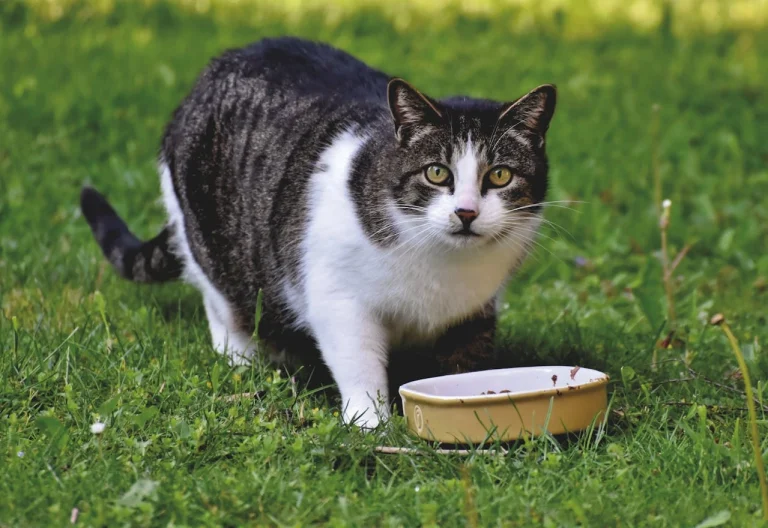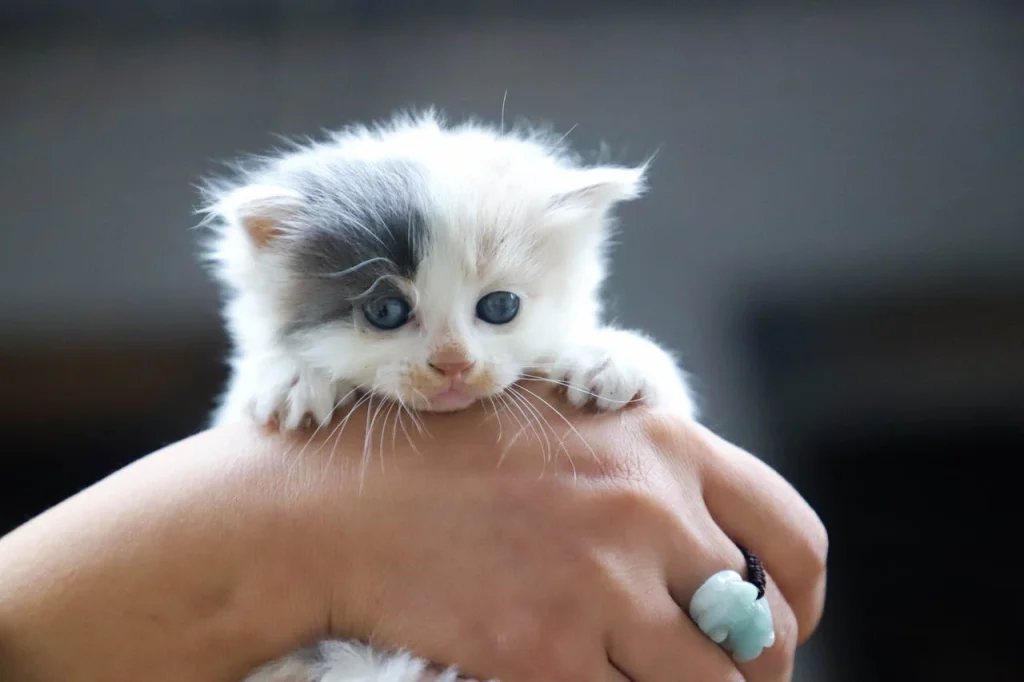
Getting a new kitten into your house is one of the most wonderful experiences ever. Nothing will feel as good as watching them find their way to you.
We, cat parents, just want our felines to be their best, especially during their prime years and development.
Kittens need a balanced diet, too. They’d also have to eat, like us, as much protein, fiber, carbs, and other nutrients as we do to maintain their forming bones. So is your little kitty getting the food needed to support healthy kitten growth?
This article is about the best kitten food you can get to ensure you are well-prepared.
What Defines Best Kitten Food?
It can become overwhelming when choosing the correct food for your kitten, as there are many options. However, some foods are especially high-quality and high-nutrient.
Key factors to consider include:
Animal Protein: Kittens are carnivores, meaning they need lots of animal protein for muscle growth and fuel. You want foods whose main ingredient is a named meat source (chicken or turkey).
Essential Amino Acids: Be sure the food has important amino acids, such as taurine and arginine, that are good for the heart, eyes, and immune system. These amino acids naturally occur in animal tissues and are the foundation of a kitten’s diet.
Balanced Fats and Fatty Acids: Mix healthy fats such as omega-3 and omega-6 fats into the diet to help grow your brain, coat, and skin. These nutrients are abundant in ingredients such as fish oil.
Appropriate Caloric Content: Kittens require more energy than adult cats. Pick high-calorie foods for their energy needs to ensure they have enough fuel for development.
Digestible Carbohydrates: While not essential, easily digestible carbohydrates can provide additional energy. However, the carbohydrate content should be moderate, as excessive amounts can lead to digestive issues.
Vitamins and Minerals: Make sure to get all of the vitamins (A, D, E, B-complex) and minerals (calcium, phosphorus) needed for bone health, and immune health. These are critical nutrients for a kitten’s growth.
Absence of Harmful Additives: Avoid foods that are color- and flavor-improved, as well as filled with preservatives and fillers (corn, wheat, soy, etc), which can trigger allergies or upset the stomach. Opt for natural, wholesome ingredients.
Moisture Content: Wet foods help hydrate and are great for the urinary tract. Include wet food in your kitten’s diet, as it will help keep them hydrated.
Life Stage Appropriateness: Choose foods designed for kittens, because they have the nutrients they need in the correct ratios to facilitate growth and development. Such formulas are specifically designed for aging cats.
Brand Reputation and Quality Control: Buy from brands known for quality assurance and nutrition compliance. Studying the labels online can give you an idea of what kind of food it is.
Best Dry Kitten Food Options
The dry kitten food is an essential part of a kitten’s diet, providing the energy and nutrients they need to develop properly. In this section, we’ll look at the benefits of dry kitten food and some of our favorite dry kitten food products.
Benefits of Dry Kitten Food
One of the most significant benefits of dry kitten food is its suitability for teeth. Dried food chews build strong jaws and remove plaque, allowing your kitty to maintain good oral hygiene and avoid periodontal disease later on. Dry kitten food contains animal fat, making the taste more interesting to kittens.
You can also store dry kitten food as it’s more convenient than wet food for cat parents. That convenience, combined with the wholesomeness, makes dry cat food one of the most popular options for cat owners.
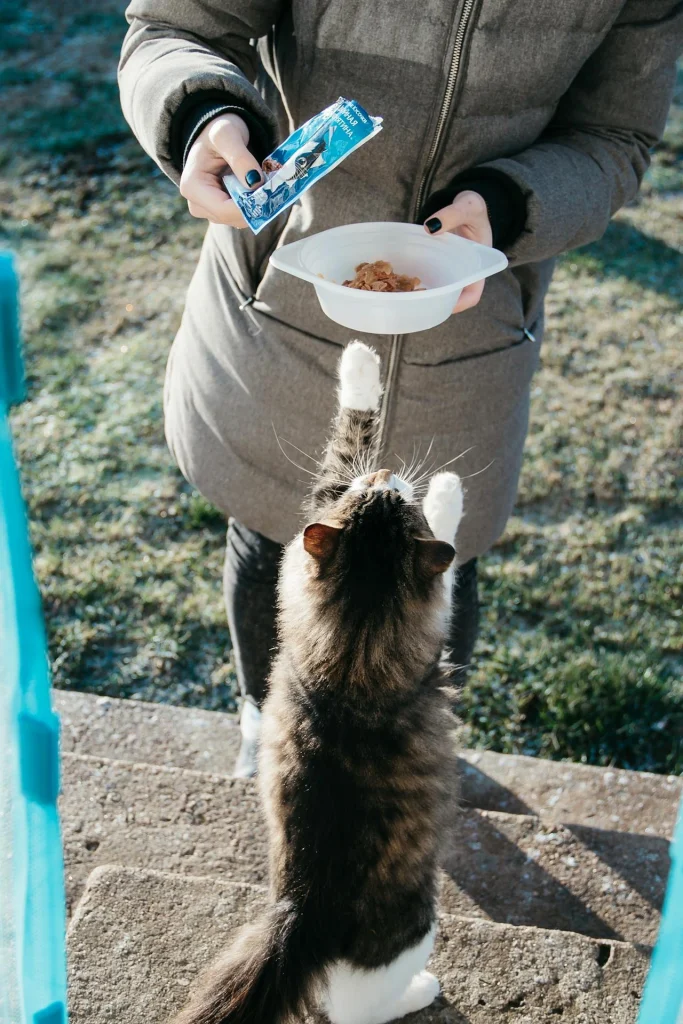
Top Dry Kitten Food Picks
The best dry kitten foods will only use quality ingredients such as real meat and never include fillers. High-quality choices make sure kittens are getting what they need to grow. The best brands are made to foster good development and good health.
Selecting the right dry kitten food will ensure your kitten has a proper diet supporting his/her growth and health.
Best Wet Kitten Food Options
Wet kitten food is equally important, especially for hydration and digestion. The below info shows you what wet kitten food offers and which are the best.
Wet food has a good amount of high-quality ingredients, including chicken liver, which is very healthy and packed with nutrients.
Furthermore, wet food can have raw bones, which are dentally beneficial and supply natural calcium. These ingredients make wet kitten food a great addition to a kitten’s diet. If you put wet food in your kittens’ meals, you can be sure they will have a healthy diet to ensure optimal growth and overall health.
Benefits of Wet Kitten Food
The moisture content of wet kitten food protects from urinary tract disease. It helps digestion, so kittens can eat easily and are less rough on sour stomachs.
Wet food is much easier for kittens with little teeth to chew and promotes healthier habits. Good wet kitten food can save you money on vet bills and improve overall health.
Top Wet Kitten Food Picks
When it comes to wet kitten food, select premium ingredients that provide good nutritional support to your kitten. Good gourmet canned food tends to contain premium meats such as kidney or liver and may include whole meat byproducts. Wet food comes in textures like jelly or broth (like chicken broth) to satisfy various tastes.
Cat parents should carefully read nutrition labels on wet kitten food to ensure it offers complete and balanced nutrition. Choosing premium wet kitten foods ensures healthy kitten growth.
Specialized Kitten Foods
Specialized kitten food treats individual nutritional requirements so kittens are in their best health during the developmental period, which is necessary for their health. Healthy long-term nutrition for kittens depends on ensuring that their food is free of harmful ingredients.
Here, we’ll cover sensitive stomach foods, grain-free foods, and prescribed diets.
Sensitive Stomach Kitten Foods
Stomach-sensitive kittens require digestive foods. These are typically easily absorbed, limited ingredient diets to boost bowel quality and overall digestion.
Kitten formula for sensitive-gut kittens often contains soft, easily digestible proteins. If you eat these foods, you will avoid gastrointestinal pain and will maintain digestive balance.
Grain-Free Kitten Foods
Grain-free kitten foods cater to kittens with grain sensitivities, promoting better digestibility and reducing allergy risks. These foods often use alternative carbohydrate sources like potatoes and legumes to ensure balanced energy levels.
Grain-free diets are tempting but must accommodate kittens’ complete nutritional needs. The appropriate choice brings full nutritional benefits for your kitten’s health.
Prescription Kitten Foods
Prescription kitten foods address specific health conditions and must be guided by a vet. They’re not sold over the counter and require a vet’s prescription. It’s always best to check with your vet that your kitten’s diet will work for their health.
If a kitten is put on a strict or prescription diet without proper diagnosis, nutritional deficiency can kill them. When taken care of by your veterinarian, your kitten’s nutritional value is well taken care of.
Common Ingredients to Avoid in Kitten Food
Skipping some of the things from kitten food will help prevent illness. Congested additives such as BHA, BHT, and artificial colors could create issues in the digestive system. A lot of sugar leads to obesity and other problems.
Rendered fats and animal scraps can contain unrefined parts with poor nutrition. Its grains, such as corn, wheat, and soy, can be challenging for kittens to digest and are often cheap fillers.
When you stay away from these ingredients, you’ll get quality, healthy food for your kitten.
Feeding Schedule and Portions
Cats should get three to four meals a day until about four months of age. At about a year old, switch your kitten to adult food, but ask your vet for specific recommendations about when to do so. You should give 1/4 to 1/2 cup of dry food for kittens between 1 and 3 pounds. Feedings can be broken up into multiple meals and still stay under a caloric cap for the day.
Monitor a kitten’s weight to avoid later problems such as obesity or underweight. They also eat differently; kittens might graze or eat regular food.
Transitioning from Mother’s Milk to Solid Food
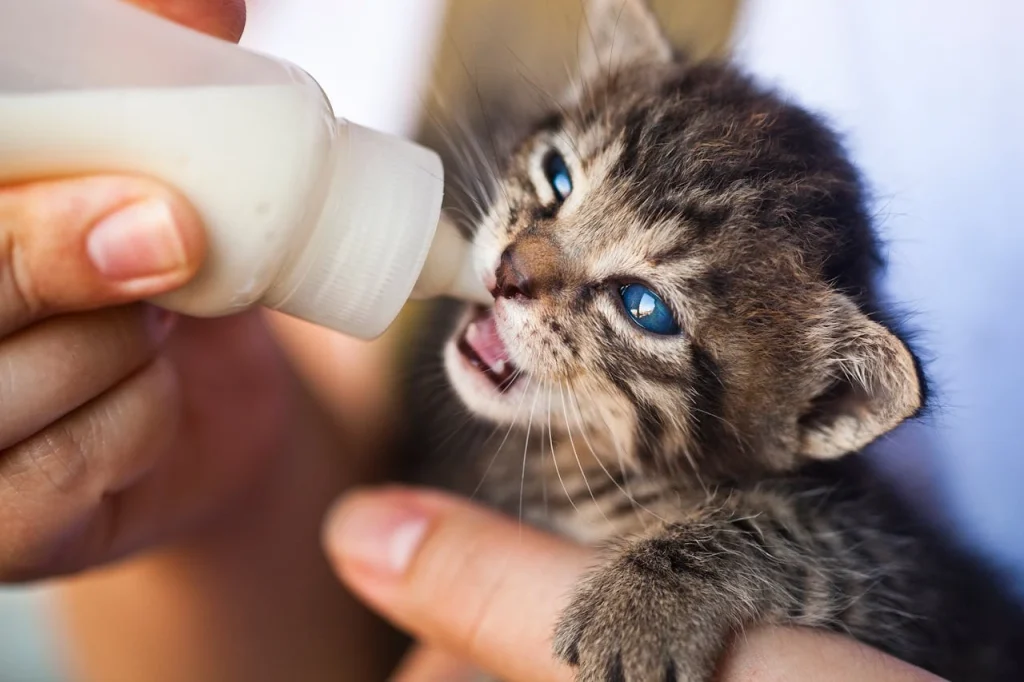
Weaning typically begins around four weeks but can start as early as three weeks. Most kittens should be fully weaned and eating solid food by eight weeks. The initial weaning food should be a balanced diet specifically formulated for kittens with AAFCO approval.
Start weaning by mixing canned kitten food with formula or warm water, gradually reducing the liquid. Post-weaning, kittens can eat wet or moistened dry food. Begin transitioning to dry food between five and six weeks, following similar steps as wet food.
Homemade vs. Commercial Kitten Food
Homemade diets allow customization, but balancing the diet can be challenging without professional guidance. This difficulty and risk make professionally formulated commercial kitten foods a safer choice.
Commercial foods that are nutritionally balanced are preferred unless your veterinarian says otherwise. When you opt for commercial kitten food, your kitten gets the nutrients needed to grow and develop normally.
Additional Tips for Kitten Owners
Treats for Kittens
Treats are a good reward for your kitten, but make sure they are healthy and nutritious. Find treats that are low-calorie and fat and high in protein and fiber. Don’t buy treats with fillers or by-products that are difficult for your kitten to eat.
Healthy kitten treats include freeze-dried chicken, salmon, or small portions of cooked chicken or turkey. Don’t be afraid to start with new foods slowly and sparingly to avoid stomach problems.
Treats shouldn’t comprise more than 10% of your kitten’s daily calories. Too many treats can make your cat obese and unhealthy, so keep track of your kitten’s weight and ensure you’re feeding them the proper treats.
Besides feeding your kitten healthy treats, there are a few other things to consider when you feed your kitten. First, keep the water always fresh. Kittens also require fresh, clean water to eat and stay hydrated. Second, try a food high in omega-3 fatty acids, like fish oil. These fats are crucial for healthy skin and fur and the growth of the brain and eyes.
Monitor your kitten’s weight and adjust feeding as needed — Consult your veterinarian to establish the right feeding schedule and portion sizes for your kitten’s needs.
Frequently Asked Questions
How often should I feed my kitten?
3-4 meals a day until they’re about four months old. After that, cut back to 2 or 3 meals.
What should you look for in kitten food?
When purchasing kitten food, know what makes for a good and balanced diet for your pup in its early years. Here’s a quick guide on how to decide:
Nutrient-Rich Formulation: Make sure it caters to kittens with high protein (not less than 30% dry basis) and moderate fat (around 20% on a dry matter basis).
Low Carbohydrates and Rich in Essential Amino Acids: Look for foods that are low in carbohydrates and rich in essential amino acids to support healthy growth.
High-Quality Ingredients: Choose foods with high-quality protein sources like chicken or salmon oil and whole grains such as brown rice or oats.
Avoid Fillers and By-Products: Avoid foods with fillers or by-products, which kittens can’t digest well.
Moisture Content: Make sure the food has at least a 75% water content to support digestion and hydration.
What are the benefits of wet kitten food?
Wet food could be the best because it’s full of moisture and keeps your kitten hydrated and healthy. Also, it’s more convenient for baby teeth to chew so that mealtime will be a breeze for little ones!
Why is high-quality animal protein important for kittens?
High-quality animal protein is also essential because it contains amino acids necessary for kittens’ growth and development. And it’s also more readily absorbed into their bodies than plant proteins, which is why it’s the best option for their growth.
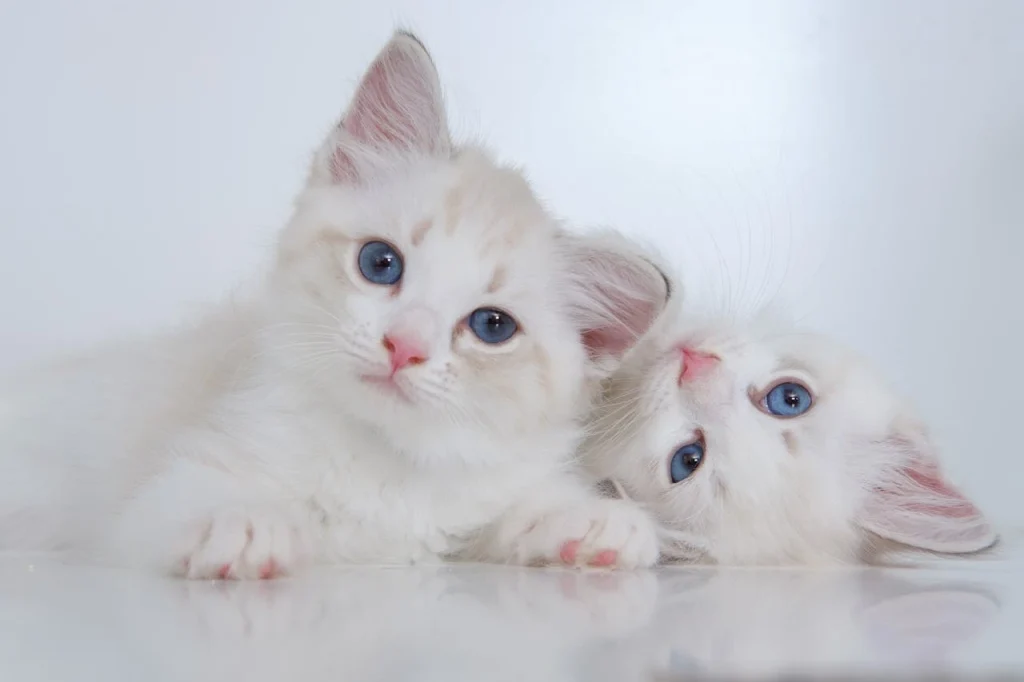
Should I choose grain-free kitten food?
Grain-free kitten food can work for your grain-sensitive kittens, but be sure to check that it is still complete and balanced to provide them with all the necessary nutrients.
What ingredients should I avoid in kitten food?
Avoid artificial ingredients such as BHA and BHT, sugar, rendered fats, and bad animal by-products in your kitten’s food. Also, avoid grains like corn, wheat, and soy, which can be tough on their tummies.
Can I add supplements like salmon oil or coconut oil to my kitten’s diet?
Yes, you could give your kitten supplements, such as salmon oil and coconut oil, but only at a moderate level. Omega-3 fatty acids found in salmon oil support the skin, coat, and brain.
Coconut oil provides energy and helps with digestion. These oils should be used sparingly and not in place of a healthy diet. Always ask your vet about the best cat nutrition supplements for your kitten’s diet.
What are the essential nutrients for kittens?
A balanced meal of protein-fat, vitamin-mineral, fatty-acid, and amino-acids is essential for kittens’ development and maintenance. Some say that a raw food diet should be recommended because cats are on raw food, and it’s suitable for their nutrition and water needs. Meeting these nutrient needs in the first year is a good start.
Calcium, phosphorus, and potassium are essential minerals that our bodies need for strong bones, healthy teeth, and proper metabolism.
The vitamins A, D, E, and K are the ones needed for:
Eye and brain development.
Synthesizing bones.
Running the metabolism.
Why does high-quality animal protein matter for kitten formula?
Kittens are obligate carnivores, and for optimal survival, they require meat. Animal protein of good quality contains amino acids their bodies don’t have much of, such as taurine and arginine, which are crucial to their health. Animal protein (at least 19%) must be a kitten’s primary source of nutrition for these needs.
The feline body uses animal rather than plant protein because they are biologically abundant. Choosing quality animal protein in kitten food saves you from losing muscle and other illnesses.
Crude protein and fat are a healthy diet that will benefit your kitten’s general well-being and healthy kitten development.

